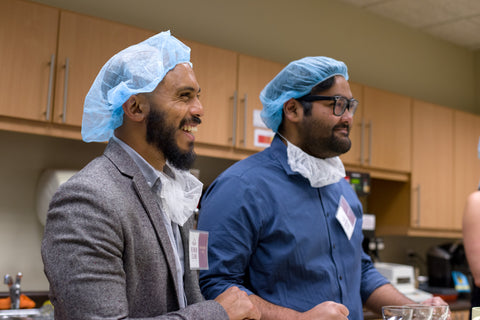Recently, members from the Home Coffee Solutions Team visited one of our coffee suppliers, Reunion Island Coffee Roasters, to take a tour of their facilities and learn about the specific techniques they use. The tour took us through the stages of storing and unpacking the coffee beans, the various roasting methods used, and finally, we got to experience the intricacies of each roast first hand with a traditional tasting.
The tour itself was eye-opening, with the huge stacks of green coffee beans reportedly only covering about two weeks of orders, and with their coming addition of a second packaging machine to keep up, the company is clearly growing. It was encouraging to see, however, that they’re staying true to their artisanal roaster philosophy through the inclusion of a small batch roaster to maintain the specific control and quantity needed to roast truly artisanal coffee. They seem to understand that while growth is wonderful, maintaining that same level of experience is still their first priority.


As we moved on to the coffee tasting, what struck us most was the tradition of the experience. Specific etiquette and procedure dictated how we tasted each coffee, and gave us an insight into how particular the process has to be in order for the coffee to be accurately judged. Elements like coffee brew time, temperature, film removal, grain thickness, and spoon placement, are integral to the process, and elevate real tasting above a quick sample in a coffee shop. One of the most interesting parts of our visit, was the introduction of two coffee processes, natural (Pulped-Natural) and washed (Wet-Process).


Generally speaking, coffee beans are prepared through a “washed” method. This includes a de-pulping, washing, and fermentation process, the fermentation being most prevalent. The coffee, including its parchment and mucilage, is left under water for a prescribed amount of time. This allows for the sugars from the mucilage to breakdown and naturally remove themselves from the beans. When the sugars are removed, this cleans the beans, hence “washed coffee”.
But Reunion Island has begun to offer coffee with a new method of preparation. While “washed” coffee beans offer a specific flavour, a very different, and very interesting, flavour profile arises from the “natural process.” This consists of picking coffee beans at their most ripe, and leaving them on a raised bed or patio, encased in the fruit, to dry under the sun. The coffee is moved throughout the day to avoid fermentation. Leaving the coffee in the fruit for so long, and with the additional drying process, brings out strong fruit flavours from the coffee.
Our team was given the opportunity to try two samples of the same coffee, grown and roasted identically, but with each form of processing. Without being told that the coffees were the same, no one on our team would have been able to link the two coffee profiles together as they were so different. The fruity flavours of the coffee added a smoothness and perkier taste, as opposed to the bolder and richer coffee profile of the washed.

Washed Coffee Processing With Fermentation

Natural Processed Without Fermentation
Below, you can see how the level of fermentation effects the whole flavour profile of the coffee:

What’s interesting is that we came out of this understanding that both types of processes and beans have their respective place in our coffee world.
Reunion Island usually recommends using naturally processed coffee beans for lattes, cappuccinos, and specialty beverages, since the fruit flavours blend well with the milk. The lattes we tried at the coffee bar after the tour definitely confirmed this as the fruity flavours and milk blended for a strawberry and cream taste that was a lovely (subtle) alternative to traditional coffee beans used in today’s typical lattes.
The washed beans are great for your staple black coffee or espresso uses, encouraged to drink simply as is to get the full flavour experience.
We’re proud to carry a perky line-up of Reunion Island products for both our Office and Home customers. On the go? Stop by Reunion Island’s coffee shop located in Roncesvalles (385 Roncesvalles Ave, Toronto, ON M6R 2N1).










